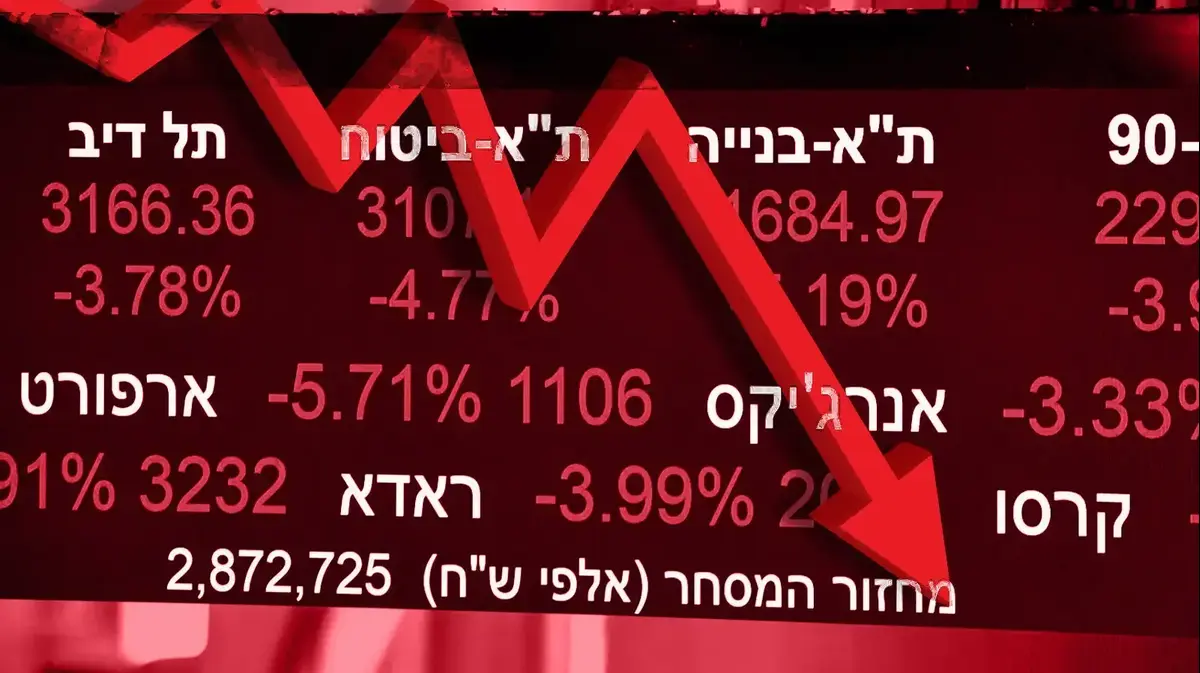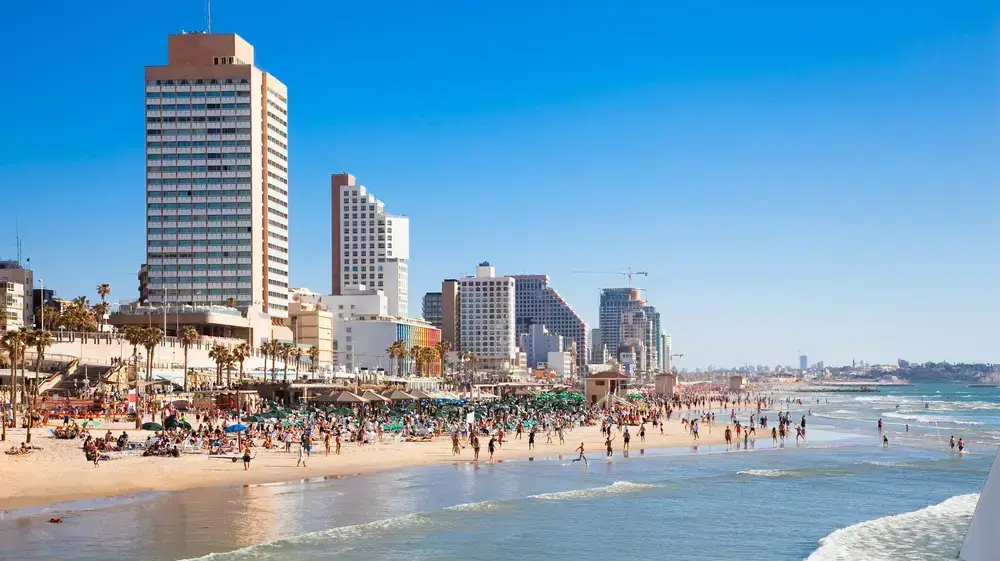Business
Market Illusions: What Scenarios Can Cut Off Investors' Dreams?
A comparison of market returns in 2020 to previous years reveals that it was an extraordinary year, with steep declines followed by even steeper rises.
What can investors expect in 2021, and in what cases may their hopes of getting rich quicker be dashed?
Tags
Wall Street
Deer Stepak
Wednesday, 06 January 2021, 05:59
Share on Facebook
Share on WhatsApp
Share in general
Share in general
Share on Twitter
Share on Email
0 comments
Yossi Danit Owitz - The Association for Lone Soldiers
Winter flood angle video and what to do with them
Ariel University of Medicine
Edelstein: Need to reach a full closure, not play ...
A young girl with a tick
Dozens of protesters against the green passport: Injury ...
Post Instagram
The Israeli Chamber of Commerce Forum calls on the government to impose a full closure ...
Zelicha founded a new party: "My goal is to save Israel ...
The Israeli Chamber of Commerce Forum calls on the government to impose a closure ...
In the video: Netanyahu calls for a close and immediate closure (Photo: GPO)
The last few years in the financial markets have generally been good for investors.
Looking at the last four years, 2017-2020, the cumulative return of the world’s major stock markets has been impressive.
The S&P 500 stock has risen cumulatively (including dividend reinvestment) by 81% during this period, while the German DAX has risen about 20%, the Japanese Nikkei has risen about 55%, and the global stock index - which includes many other markets, including Emerging markets - increased by about 65%.
Above all, the Nasdaq index stood out, with the large share of technology stocks, rising no less than 175% in the last four years.
In Israel, too, despite the declines in 2020 in the leading stock indices, there has been a cumulative increase of about 2% in the last four years. In the TA-35 index, an increase of about 22% in the TA-125 index, and a jump of about 95% in the TA-90 index.
Government bonds in Israel, with a cumulative increase of about 13% in four years, and corporate bonds, with an increase of about 14% during that period, did not disappoint either. All of these owe their yields mainly to low or zero and sometimes negative interest rates.
So far the returns are cumulative.But, looking at each of the years separately, it turns out that these were very different years from each other.
More on Walla!
NEWS
"Supportive family": Beitili strengthens the lone soldiers
To the full article
However, warning signs may appear that will redraw the screens in red (Photo: Gettyimages)
And here we are at the beginning of 2021, and the question is whether this year will be similar to one of the last years, and if so, in what direction, in what intensity and with what level of volatility?
The corona plague has quite a few downsides, of course.
But, one of the only positive things (depending on the eye of the beholder) that can be said about her, is that she helped market investors discover the secret of "eternal" wealth.
The zero interest rate that the Corona has taken care to "fix" does the job regardless of the economic reality, and regardless of the hundreds of millions of unemployed who walk around idle.
When interest rates are at zero, and sometimes even minus, people are looking to earn more than that - and certainly not interested in losing on "solid" investments.
From here to the influx of investors into shares (see the phenomenon of "Robin Hood", the successful investment platform, US) a short way - and there is also a short way to stock appreciation, without contact or with a weak link to the profitability of these companies.
After all, if the interest rate is about 0%, and the Austrian government bond yield for 100 years, for example, is about 0.06% per year, a nominal yield before inflation, so why are stocks, not even of technology companies, trading not at a profit multiplier of 20 or 30, but at a multiplier of 100?
So let's distribute money to everyone, who will invest the money in the stock market - what will raise stock prices, will enrich us all, and here we have cracked the formula for getting rich in a strictly legal way.
But, before we drift into euphoria, let’s mention that there is more than one scenario that could disrupt the fulfillment of our dreams of getting rich quick.
Scenarios that could cut off investors' dreams
The effectiveness of corona vaccines.
Since there is still no real experience beyond the experiments that have been conducted prior to vaccine approval, it is impossible to determine that the virus will disappear from our lives, and it is impossible to completely rule out the possibility that a mutation will not develop that the vaccine will not be effective against.
Beyond that, it is not clear how long the vaccine will be effective, and it is still not clear what the long-term consequences of the vaccine are, if at all.
Answers to all of these questions may have cumulative implications for closure policy and public morale, and as a result also for the behavior of financial markets.
World Bank Policy.
Fiscal support policies are expected to continue to flow directly to consumers, and monetary support policies are also expected to continue in the form of direct support in government and corporate bond markets, and indirectly in stock markets. Beyond the huge deficit that such a policy creates, the hard and threatening result for stock markets is inflation. Although the 2008 crisis, to the surprise of economists, was not accompanied by inflation, it does not guarantee that the current crisis did not produce inflation, Reached consumers, while in the current crisis money goes directly to consumers - which may generate high demand, when supply will not necessarily increase at the same rate.
The status of high-tech giants.
The stocks that have pulled up the U.S. stock indices are technology stocks, many of which have proven their superiority even in the corona crisis. FAANG shares - just five shares out of 500 shares in the S&P index - Facebook, Apple, Amazon, Netflix and Google - have been responsible for 20 years % To 30% of the total rate of increase in the index. They swept quite a few stocks with them. But, some of these companies, especially Facebook and Google, are currently at the center of harsh, public, media and regulatory criticism, which is reflected in a wave of lawsuits threatening their existence in their current format. It is just the beginning of a process that is expected to take several years and obscure the stocks of these companies, and just as these stocks have dragged the entire stock market up, so, symmetrically, they may pull it down.
State of the world banking system.
The state of the US banking system is much better today than it was on the eve of the 2008 crisis, as in the years since, banks have worked to strengthen their capital infrastructure - but there are still quite a few leveraged American companies that owe their very low interest rates. In a continuing state of economic slowdown, zero interest rates will no longer help them, and this could lead to bankruptcy, with all the clear implications for both banks and capital markets. The main weakness of the banking system is in Europe, especially the Italian and Spanish banking systems, and more. Probably China.
Cyber attack as a pretext for war.
It is becoming increasingly clear that cyber attacks on sensitive government and public websites are becoming a "routine matter".
There is a limit that, if crossed, could cause a cyber attack, for example, on security, military, and even civilian sites, such as an attack on passenger planes that would cause them to crash, to serve as a pretext for war.
There is still a problem locating the source of the attacks, but I guess the answer will be found.
American-Chinese trade war.
Anyone who thinks that the US-China trade war, which has repeatedly shaken the American stock markets and with them the world stock markets, ends with the end of the Trump era - is wrong. The reason is simple: the trade war is actually a code name for a much bigger war - a war for technological superiority , And later also on military supremacy between the two powers - so that it is going to accompany us and the financial markets for quite a few more years.
Inequality in civil society.
Can the reader wonder, what about inequality and stock markets?
Well, there is a connection, even if it is indirect.
There is no doubt that the corona crisis has severely affected the low- and middle-income earners and enriched the rich, for beyond the phenomenon of unemployment and harm to the wages of the weak, the rich on the other hand became rich not from their wages but from the miraculous recovery of stock markets.
Most of the wealth is concentrated in the hands of the 65-plus-year-olds, while the economically disadvantaged in Corona are members of the millennial generation, who were hit even earlier in the 2008 crisis, and have electoral power that will only grow and go.
Therefore, the phenomenon of inequality may turn out to be a plague of the 21st century and cause such political shocks, which will seep into populist regimes - and from there to Wall Street.
The current price level in the markets.
The current price level in the stock markets can be explained, and the disconnect between it and what is happening in the real economy can also be explained.
It can be said, for example, that the corona virus is on its way to disappearing, and that since the current crisis is originally health, not financial-economic, recovery from it will be very rapid, which is what the markets expect.
Therefore, even the business companies will return to profit at the level they have become accustomed to and will grow again.
On the other hand, the low, zero, and sometimes even negative, interest rate is here to stay a few "good" years - which will result in a required shift of funds to risky assets such as stocks.
All this is good and beautiful.
But, there is general agreement that today the price level is high, and in large part is explained by the zero interest rate and the unattractiveness of yields on government bonds.
When this is the case, any shock in the alternative investment channels for some reason could lead to a painful fall in the stock markets.
Scenario of "Black Swan".
And after all we have said, constitutive events can also occur that are defined as "black swans" - and therefore by definition, also unexpected - and there is another long line of "white swans" that did not even mention that their origins may be, for example, in places like North Korea, China -Taiwan, Iran and more.
The writer is one of the owners of Meitav Dash Investment House.
This should not be construed as a recommendation or substitute for the reader's independent discretion, or an invitation to make a purchase or investment and / or any actions or transactions.
Mistakes may occur in the information and market changes may occur
Share on Facebook
Share on WhatsApp
Share in general
Share in general
Share on Twitter
Share on Email
0 comments






/cloudfront-eu-central-1.images.arcpublishing.com/prisa/O3URHWIQOUAJHPGYUFW2ZWAF2I.jpg)


